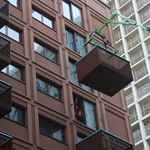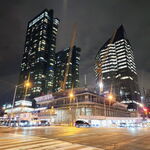Glen
Senior Member
At least those unfortunate Toronto residents that are not shiny or happy can travel to the 905 for employment. Even those higher paying office jobs have moved, or increased more, in the 905 region.....
City of Toronto employment in the sector grew at 2.3 percent during the recent four-year period (2000-2004), higher than the overall employment growth rate of 1.5 percent. However, when taken into the geographic context of the 905 versus 416 regions, financial services growth in the 905 eclipses that of the City of Toronto recording growth rates of more than 6 percent over the four and 10-year periods.
Insurance and Securities/Investment have driven Financial Services’ regional growth during the past 10 years. However, the City of Toronto has lost ground in the Insurance sub-sector over the four and 10-year periods, recording negative growth while the 905 racked up double-digit growth over the four-year period and 8.7 percent over the longer term. The 905 share of insurance employment now stands at 59 percent surpassing the City of Toronto at 41 percent. Growth in the Securities/Investment sub-sector has been strong at close to five percent over the four and 10-year terms in the City of Toronto. The 905 levels for the same periods have been twice that at 9.9 percent and 11 percent respectively. However, the City of Toronto still retains the majority of securities employment at 55 percent.
Some Financial Services jobs are mobile and are highly susceptible to re-location. The Financial Services Sector Profile reveals that employment gains have already been made in the 905 region as compared to City of Toronto from 1994 to 2004. In addition, the 2003 TFSA Competitiveness Survey found that 70 percent of Toronto region firms had contemplated their options whether to expand, downsize or relocate. In the face of escalating cost pressures, including taxes, all levels of government must work together to create a positive and competitive business environment.
2002, the 905 area became a net importer of labour from Toronto and the rest of Ontario. In 2003, the 905 area finally surpassed the City of Toronto in terms of total employment. Already in 2001, more City residents commuted to jobs in Vaughan, than Vaughan residents worked in the City.




